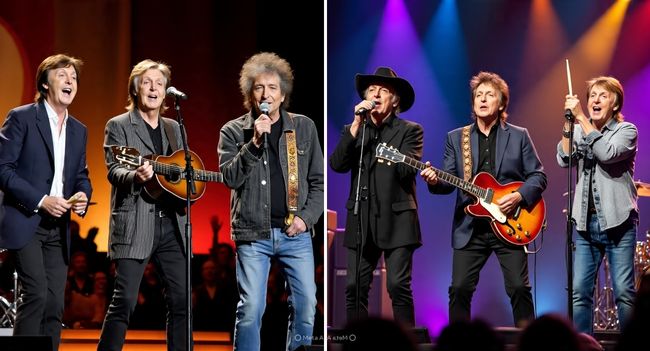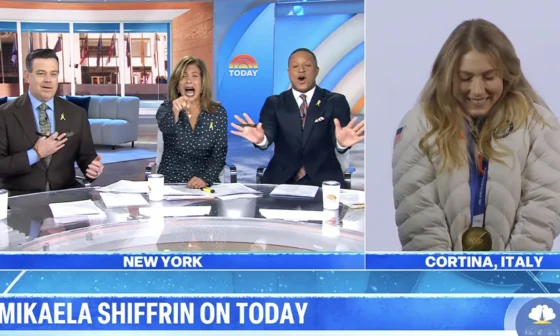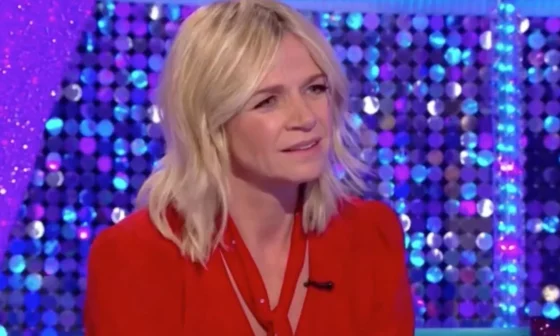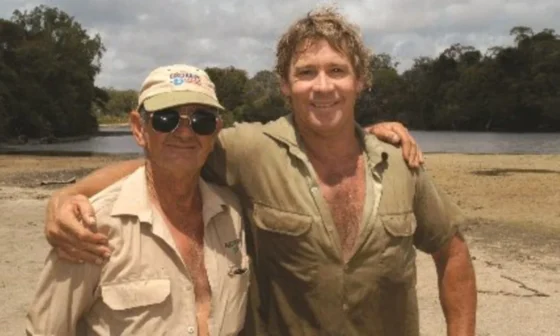Nearly 20,000 fans had come expecting another unforgettable night on Paul McCartney’s sold-out world tour. What they got instead was something no one — not even the most devoted Beatles scholar or Dylan die-hard — could have seen coming.
The energy was electric, the setlist familiar. At 83, Paul was still captivating crowds, his voice aging yet somehow timeless. The night had been a kaleidoscope of Beatles hits, Wings classics, and tender solo numbers. Then, after a delicate performance of “Blackbird,” the air shifted.
Paul started picking an unfamiliar melody — soft, slow, almost hesitant. Even the most obsessive fans couldn’t place it. A few bars in, he stopped abruptly.
No fading out, no graceful pause. He simply set his guitar down and stood still.

The arena fell into a thick, uncertain silence.
Then Paul said four words — and his voice wavered:
“I can’t do this.”
Gasps swept through the crowd. Some thought it was his health. Others thought it might be the end of the show, or worse — the end of Paul on stage forever.
Then the lights dimmed, and a single spotlight swiveled to the back of the stage.
Out walked Ringo Starr, drumsticks in hand, smiling softly. The audience erupted — a tidal wave of cheers, screams, and disbelief. Before the roars could settle, another figure appeared: Bob Dylan, dressed in black, guitar slung low, eyes shadowed beneath his hat.

No words. No announcements. No explanations.
Just history, unfolding.
A Song Buried by Time and Ego
McCartney slid behind the piano. Ringo settled at the kit. Dylan stood silently to Paul’s left. Without a word, they began to play.
What followed was unlike anything the world had ever heard — yet it carried the unmistakable echoes of the 60s: raw, stripped down, steeped in heartbreak. An acoustic ballad — gentle chords, ghostly melody, and lyrics that spoke of fleeting youth, fractured friendships, and longing for peace with the past.
The crowd didn’t know it yet, but they were hearing “The Other Side of Summer” — a song rumored for decades to exist but never confirmed. Written in secret by McCartney, Dylan, and Starr in a cramped London flat in 1964, it was supposed to unite them as collaborators. Instead, creative differences — and egos — tore the partnership apart before it could begin. The song was shelved, left to collect dust in memory.
For years, whispers of it surfaced in interviews, in cryptic comments from Dylan, and deep in fan forums. But it was never recorded. Never performed.
Until tonight.

“That Was for John.”
As the final verse approached, something in Paul’s voice cracked — the weight of years, of loss, of a generation gone. He closed his eyes, singing the last lines with a tenderness that made the arena feel like a living room.
“Maybe one day we’ll find the words we lost…”
And then… silence.
No one dared move.
Paul slowly opened his eyes, looked out over the hushed crowd, and whispered:
“That was for John.”
Phones were lowered. Tears were wiped. For a moment, Madison Square Garden wasn’t a stadium — it was a sacred space where history, grief, and forgiveness danced quietly together.
No Encore. No Studio Cut. Just One Night.
The trio didn’t take a bow. They didn’t replay the song. They walked off stage together, arms around each other, disappearing into the same shadows where this story had begun six decades ago.
By morning, social media was ablaze. Clips flooded the internet, though no full recording emerged. No official footage. No studio version.
When asked later why, McCartney said in an interview:
“That night wasn’t for the charts. It wasn’t for cameras. It was just for us — and for John.”
In an age obsessed with viral moments and instant recordings, this was something rarer: a fleeting, unrepeatable moment of grace. A memory shared by those lucky enough to be there — a final reconciliation between old friends, a gift to a fallen Beatle, and a song that lived — briefly — before vanishing forever.
That night, music history wasn’t written in headlines.
It was written in silence, in a song lost to time, and in three legends finding their way back — if only for one night.






